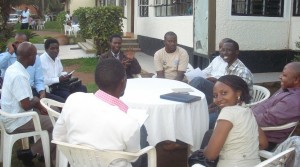“We have heard disciples of Christ, we have seen people preaching the Gospel on streets of Kampala, the whole world now needs disciples of climate” said Davis Ssempuma, one of the 350 Ugandan organizers I met on April 13, 2012 at Makerere University.
During an hour and half, organizers shared their experiences as activists and different ideas on how to strengthen the movement. Among the participants in that meeting, were David Ssemwogerere and Yvette Ampaire who have greatly contributed to start the movement not only in Uganda but also across East African region through Energy Crossroads.
I had the opportunity to explain to those who join the movement recently what 350.org is about, and especially our focus for 2012: Climate Impacts Day, 350 Local and training of trainers. So far, 2 organisers have already registered actions in Uganda, and now working on details. Those actions are focused on community sensitization on climate impacts and adaptation solutions. Organisers agreed to meet again soon to apply for 350 local. This will definitely contribute to boost the rhythm of activities, especially to be able to implement the diverse campaign ideas that have been expressed, ranging from engaging elected leaders to fight climate change to the use of ICT and media in sensitization of communities and promotion of renewable energy and organic farming.
Later on Saturday, I met John and Stephen from the Kikandwa Environmental Association, a community based organization addressing rural development issues and natural resources management in the districts of Mubende and Mityana. John, who took part in the story telling workshop organized earlier in January by the Million Person project, told me the impacts of climate on the ground. “Rainfall stopped early last year in October instead of December and again delayed a lot in 2012. We have been waiting for rains since February but we have just started getting some r in April”. This is a very worrying situation for the less advantaged communities in those areas who rely on rain-fed agriculture for their survival. However, John believes in the combination of both indigenous and modern knowledge to improve the livelihoods of communities. John and his colleague look forward to working with the rest of the 350 network in Uganda for greater learning, powerful activism and sharing of experiences.

